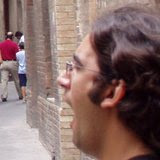9-10 Haziran'da İTÜ Ayazağa kampüsünde İTÜ Doğal Dil İşleme Çalışma Takımının düzenlediği bir çalıştay olacak.
Destekleyenler arasında TDK da var. TDK'ya sözlüklerini akademik araştırmalara neden açmadıklarını sormak için güzel bir fırsat olabilir.
Siteden biraz daha ayrıntı eklemek gerekirse:
Amaç :
Dil bilimciler ile bilişimcilerin bir araya gelmeleri sağlanarak bilişim ile dil bilimi alanında gelişmelere kısaca göz atmak, ülkemizdeki çalışmaları irdelemek ve gelecekte yapılabilecek çalışmalar konusunda görüş alışverişinde bulunmak, yeni projeler ortaya koymak
Kapsam :
Türkçe Derlem Oluşturulması
Bilgisayarlı Çeviri Sistemleri
Elektronik Sözlüklerin Hazırlanması
Düzenleme :
Türk Dil Kurumu
İTÜ Bilgisayar Mühendisliği Bölümü
DDİ Çalışma Takımı
TİKA
Türk İşbirliği ve Kalkınma İdaresi Başkanlığı
Destekleyenler :
Türkiye Bilişim Derneği
İTÜ Bilgisayar Mühendisliği Mezunlar
Derneği
14 Mayıs 2006
3 Mayıs 2006
Webber & Steedman
Haftaya Pazartesi ve Salı günü Bonnie Webber ve Mark Steedman Boğaziçi Üniversitesinde birer konuşma verecekler. Şu an için yer tam olarak belli değil. Aşağıda konuşmaların özetlerini bulabilirsiniz.
The schedule:
May 8: Bonnie Webber -14:00 Talk
-16:30 Research discussion
-19:30 Dinner
May 9: Mark Steedman -14:00 Talk
-16:30 Research discussion
Location of the talks: To be announced
======= Bonnie Webber Abstract =========
A Lexical Perspective on Discourse Structure and Semantics
To date, Language Technology has derived its greatest success from
words and word-level techniques. Since discourse is so much more than
words, is it beyond the potential of this technology? This talk will
suggest that the answer is "no", arguing that the lexicon provides a
robust basis for low-level discourse structure and semantics as well.
I start by reviewing some previous proposals regarding discourse
structure and semantics, and then describe a lexicalised approach
modelled on Lexicalised Tree-Adjoining Grammar. What is attractive
about this approach from a linguistic perspective, is the range of
phenomena that it is able to explain.
On the other hand, interesting phenomena are not necessarily common
phenomena. So to provide an empirical base for low-level research on
discourse, I have been working with colleagues at the University of
Pennsylvania on the "Penn Discourse TreeBank", which recently saw its
first release (http://www.seas.upenn.edu/~pdtb/). I will conclude the
talk by describing features of this resource and what it might allow
researchers to discover.
========= Mark Steedman Abstract =================
Plans and the Computational Structure of Language
Linguistics has been a computational science for almost fifty years,
since Chomsky first used formal language theory to characterize
structure and complexity in natural language. Yet researchers continue
to appeal to new kinds of computational thinking as they frame
problems and results in the science of language. This talk focuses on
two case studies of particular recent interest, whose common goal is
to explain language in its broader evolutionary and biological
context. The first case study concerns an account for the structure of
language. Here computational approaches to agency---which showcase
close parallels between language use in dialogue and other kinds of
collaborative real-world activity---promise to link the grammatical
representations implicated in language use to the the more general
symmetric representations of ones' own and others' real-world actions
that are the hallmark of primate social cognition. The second case
study concerns an account of language processing. Here computational
frameworks for approximate probabilistic inference---informed by
striking correlations between the time-course of linguistic processing
and the dynamics of uncertainty in the evidence available to the
processor---suggest how the mechanisms of language use could
simultaneously arise from more general neural or cognitive mechanisms.
The schedule:
May 8: Bonnie Webber -14:00 Talk
-16:30 Research discussion
-19:30 Dinner
May 9: Mark Steedman -14:00 Talk
-16:30 Research discussion
Location of the talks: To be announced
======= Bonnie Webber Abstract =========
A Lexical Perspective on Discourse Structure and Semantics
To date, Language Technology has derived its greatest success from
words and word-level techniques. Since discourse is so much more than
words, is it beyond the potential of this technology? This talk will
suggest that the answer is "no", arguing that the lexicon provides a
robust basis for low-level discourse structure and semantics as well.
I start by reviewing some previous proposals regarding discourse
structure and semantics, and then describe a lexicalised approach
modelled on Lexicalised Tree-Adjoining Grammar. What is attractive
about this approach from a linguistic perspective, is the range of
phenomena that it is able to explain.
On the other hand, interesting phenomena are not necessarily common
phenomena. So to provide an empirical base for low-level research on
discourse, I have been working with colleagues at the University of
Pennsylvania on the "Penn Discourse TreeBank", which recently saw its
first release (http://www.seas.upenn.edu/~pdtb/). I will conclude the
talk by describing features of this resource and what it might allow
researchers to discover.
========= Mark Steedman Abstract =================
Plans and the Computational Structure of Language
Linguistics has been a computational science for almost fifty years,
since Chomsky first used formal language theory to characterize
structure and complexity in natural language. Yet researchers continue
to appeal to new kinds of computational thinking as they frame
problems and results in the science of language. This talk focuses on
two case studies of particular recent interest, whose common goal is
to explain language in its broader evolutionary and biological
context. The first case study concerns an account for the structure of
language. Here computational approaches to agency---which showcase
close parallels between language use in dialogue and other kinds of
collaborative real-world activity---promise to link the grammatical
representations implicated in language use to the the more general
symmetric representations of ones' own and others' real-world actions
that are the hallmark of primate social cognition. The second case
study concerns an account of language processing. Here computational
frameworks for approximate probabilistic inference---informed by
striking correlations between the time-course of linguistic processing
and the dynamics of uncertainty in the evidence available to the
processor---suggest how the mechanisms of language use could
simultaneously arise from more general neural or cognitive mechanisms.
Kaydol:
Kayıtlar (Atom)
